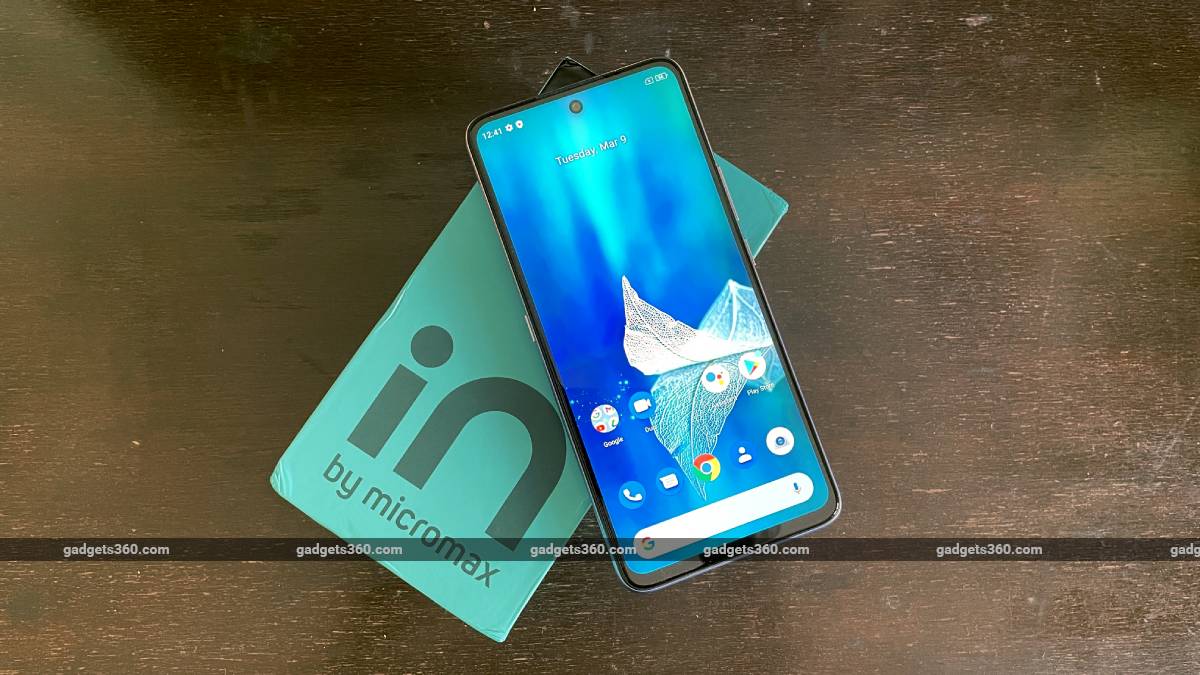Micromax tried making a splashy comeback in 2020 and its two new smartphones, the In 1b (Review) and In Note 1 (Review), have been heavily marketed as Indian-made phones from an Indian company. While Micromax might not quite be in a position to take on the biggest Chinese competitors yet, it has made a start. Now, a third model, the simply named In 1, joins this young portfolio. The budget space is crowded with recent launches as well as older models that remain popular, so Micromax needs to serve up something very impressive if it wants to stand out.
The Micromax In 1 is priced at Rs. 10,499 for the 4GB RAM/ 64 GB storage variant (introductory offer: Rs. 9,999), and Rs. 11,999 for the 6GB RAM/ 128 GB storage variant (introductory offer: Rs. 11,499). It will go on sale starting from March 26 on Flipkart and on the Micromax website.
What you’ll notice first about the front is the large camera cutout in the top-centre of the 6.67-inch screen. Micromax says this is a more modern and immersive design than having a notch, but it’s sure to be distracting even in everyday use, not just when watching full-screen content. The display has a full-HD+ resolution. Micromax claims 82 percent NTSC colour gamut coverage and 80 degree viewing angles, which are not bad for a budget phone.
The Micromax In 1 is a fairly large phone. It’s 8.99mm thick and feels about average in terms of weight. There’s a 5000mAh battery and a MediaTek Helio G80 SoC under the hood, making for some decent core specifications. 18W fast charging is supported. There are two variants of the Micromax In 1; the first has 4GB of RAM and 64GB of storage, while the other has 6GB of RAM and 128GB of storage.
You can choose between Purple and Blue colour options. My Purple review unit has a gradient finish which is actually more lilac at the top and pale blue at the bottom. You can’t miss the huge X-shaped pattern across the rear. The plastic panel isn’t glossy, but it does reflect light as you turn this phone around in your hands.
The fingerprint sensor on the back is reasonably within reach. The camera module protrudes a little and it’s interesting to see only three lenses here – Micromax has resisted the temptation to go with “quad cameras” for marketing, but there is a fourth dummy circle that might makes this look like a more premium phone, at least at first glance. What you do get are a primary 48-megapixel camera, a 2-megapixel macro camera and a 2-megapixel depth sensor.
The power and volume buttons are on the right, and there’s a Google Assistant button on the left. The SIM tray has slots for two Nano-SIMs as well as one for a microSD card. There’s a USB Type-C Port, 3.5mm audio socket and speaker on the bottom.

The X pattern on the back is immediately noticeable
One issue with the Micromax In 1 is construction quality. I could feel the rear panel flex every time I picked up this phone, and it constantly made a slight creaking noise even with very simple use. I hope this is an isolated issue with my review unit, which might be from an early production run. There was also a regulatory sticker which was very hard to remove and left a slight gummy residue on the back of my device.
A big selling point for Micromax will be that it is now using stock Android which means there’s no bloatware, no ads, and no other annoyances. Sure enough, I was happy to see that there aren’t any preloaded apps beyond Google’s usual selection. There’s also very little in the way of customisations, apart from a few gestures and shortcuts, so that’s the tradeoff you make against the feature-rich UIs that other manufacturers offer.
Micromax is promising guaranteed Android updates for two years and monthly security patches, which is great news. The Micromax In 1 arrived running Android 10, and it really should have been Android 11 considering how much of a selling point the software is. An update should arrive by May though, and at least security is fully up to date with the March 2021 patch.
We’ll soon be testing the Micromax In 1 to tell you all about its performance, usability, cameras, battery life, and much more.
